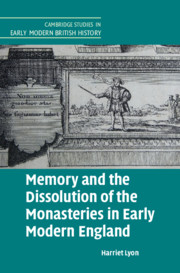Book contents
- Memory and the Dissolution of the Monasteries in Early Modern England
- Cambridge Studies in Early Modern British History
- Memory and the Dissolution of the Monasteries in Early Modern England
- Copyright page
- Dedication
- Contents
- Figures
- Acknowledgements
- Note on the Text
- Abbreviations
- Introduction
- Chapter 1 ‘No News but the Abbeys Shall Be Down’
- Chapter 2 ‘Worthy of Lasting Memory’
- Chapter 3 ‘Raised Out of the Ruins’
- Chapter 4 ‘Many Pretty Odd Tales’
- Conclusion
- Bibliography
- Index
Chapter 3 - ‘Raised Out of the Ruins’
Monastic Sites in the Early Modern Topographical Imagination
Published online by Cambridge University Press: 08 October 2021
- Memory and the Dissolution of the Monasteries in Early Modern England
- Cambridge Studies in Early Modern British History
- Memory and the Dissolution of the Monasteries in Early Modern England
- Copyright page
- Dedication
- Contents
- Figures
- Acknowledgements
- Note on the Text
- Abbreviations
- Introduction
- Chapter 1 ‘No News but the Abbeys Shall Be Down’
- Chapter 2 ‘Worthy of Lasting Memory’
- Chapter 3 ‘Raised Out of the Ruins’
- Chapter 4 ‘Many Pretty Odd Tales’
- Conclusion
- Bibliography
- Index
Summary
Chapter 3 focuses on space and the visual dimensions of the memory of the dissolution. Concentrating on the period between the late sixteenth century and the late seventeenth century, it examines the work of a number of antiquaries who produced topographies and images of former monastic sites. Taking previous scholarship on the ‘nostalgic’ element in antiquarian topographies of the dissolution as its main point of departure, this chapter addresses the role of monastic ruins together with those sites that were converted to new uses, both spiritual and secular, in shaping changing perspectives on the suppression. It argues that we should pay more attention to converted spaces – whether parish churches or private homes – which could function to reinforce the project to forget the dissolution across the generations. To support this argument, this chapter also features a substantial discussion of the visual afterlives of the dissolution. It illuminates what recent scholarship has described as a seventeenth-century visual culture of ‘pastness’, but also hypothesises the emergence of a parallel and equally powerful visual culture of the present. Ultimately, it suggests that topographical writing and images were genres in which senses of loss could converge with gain, past with present, and remembering with forgetting.
- Type
- Chapter
- Information
- Publisher: Cambridge University PressPrint publication year: 2021

